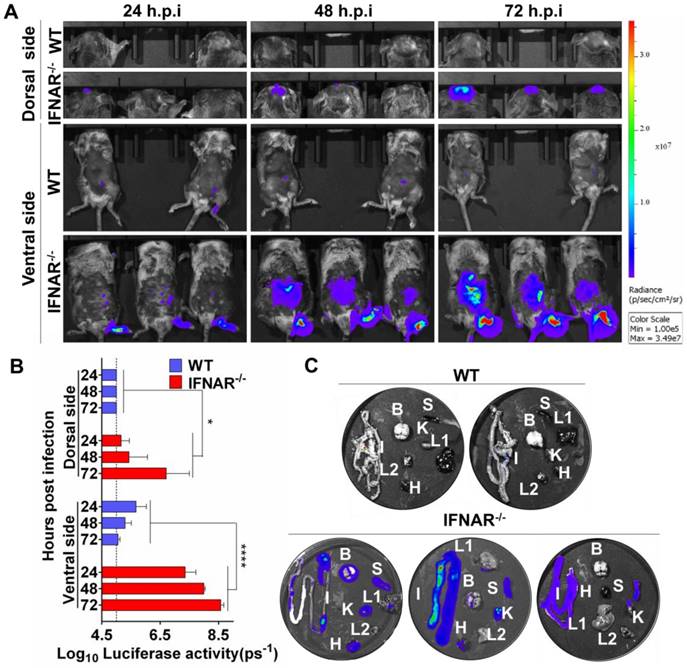In present study, the research group led by Prof. ZHANG Bo from Wuhan Institute of Virology of the Chinese Academy of Sciences and the research team led by Prof. QIN Chengfeng from Institute of Microbiology and Epidemiology of the Academy of Military Medical Sciences made an important breakthrough in the pathogenic mechanism of arthropod-borne flaviviruses. By using in vivo bioluminescence imaging (BLI) technology, they dissected the replication and dissemination dynamics of Japanese encephalitis virus infection in mice upon different inoculation routes, which intuitively presented the key role of interferon (IFN) system in the progress of control of Flaviviruses. These results have been published in Theranostics entitled " Visualization of a neurotropic flavivirus infection in mouse reveals unique viscerotropism controlled by host type I interferon signaling".
Arthropod-borne flaviviruses include a large family of important human pathogens such as yellow fever virus (YFV), Japanese encephalitis virus (JEV), Dengue virus (DENV), Zika virus (ZIKV) and etc. Two thirds of the population in the globe lives in the epidemic area of arthropod-borne flaviviruses. Even more unfortunately, the outbreak of Zika virus disease in South Africa in 2015 seriously threatened the human health in that area. These arthropod-borne flaviviruses are maintained in a transmission cycle in a zoonotic cycle between vectors and vertebrates, and humans get infected by bites of infected vectors. However, the dynamic dissemination and pathogenesis of their infections remain largely unknown.
By using JEV as a model, the scientists rationally designed and constructed a recombinant reporter virus that stably expressed Renilla luciferase (Rluc). The resulting JEV reporter virus (named Rluc-JEV) and parental JEV exhibited similar replication and infection characteristics, and the magnitude of Rluc activity correlated well with progeny viral production in vitro and in vivo. By using BLI technology, they dissected the replication and dissemination dynamics of JEV infection in mice upon different inoculation routes. Interestingly, besides replicating in mouse brain, Rluc-JEV predominantly invaded the abdominal organs in mice with typical viscerotropism.
On the above basis, further tests in mice deficient in type I interferon (IFN) receptors demonstrated robust and prolonged viral replication in the intestine, spleen, liver, kidney and other abdominal organs. The host type I IFN signaling was evidenced as the major barrier to the viscerotropism and pathogenicity of this neurotropic flavivirus.
These results revealed abdominal organs as important targets of JEV infection in mice and profiled the unique viscerotropism trait controlled by the host type I IFN signaling. Additionally, this in vivo visualization technology described provides a powerful tool for testing antiviral agents and vaccine candidates for flaviviral infection.
LI Xiaodan and DENG Chenglin from Wuhan Institute of Virology of the Chinese Academy of Sciences, LI Xiaofeng and DONG Haolong from Institute of Microbiology and Epidemiology of the Academy of Military Medical Sciences are equally contributing authors, and Prof. ZHANG Bo and Prof. QIN Chengfeng are correspondence authors for. This work was supported by the National Key Research and Development Program of China, the National Natural Science Foundation of China (NSFC) and the Newton Advanced Fellowship from the UK Academy of Medical Sciences.

Type I IFN plays a critical role in control of viral dissemination in mice. Image by ZHANG Bo
Contact:ZHANG BoE-mail:zhangbo@wh.iov.cn Wuhan Institute of Virology, Chinese Academy of Sciences, Wuhan, Hubei, People's Republic of China(http://english.whiov.cas.cn/)




